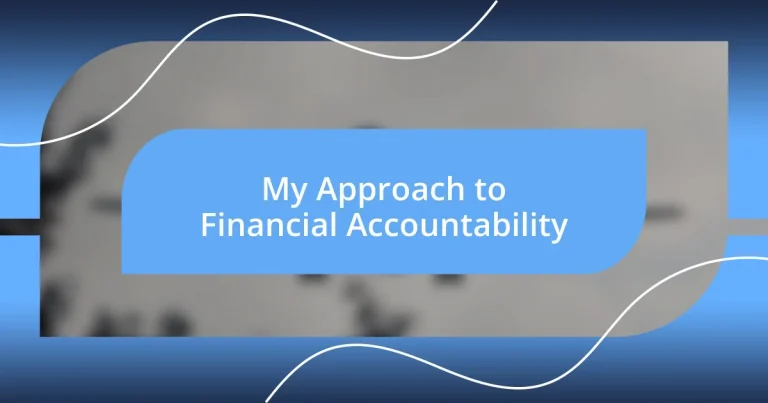Key takeaways:
- Financial accountability transforms the relationship with money through regular reflection, informed decision-making, and clarity on spending versus values.
- Setting clear and achievable financial goals enhances motivation, progress tracking, and aligns spending with long-term aspirations.
- Regularly evaluating financial progress fosters accountability, encourages discussion with others for fresh perspectives, and adapts strategies for continuous improvement.
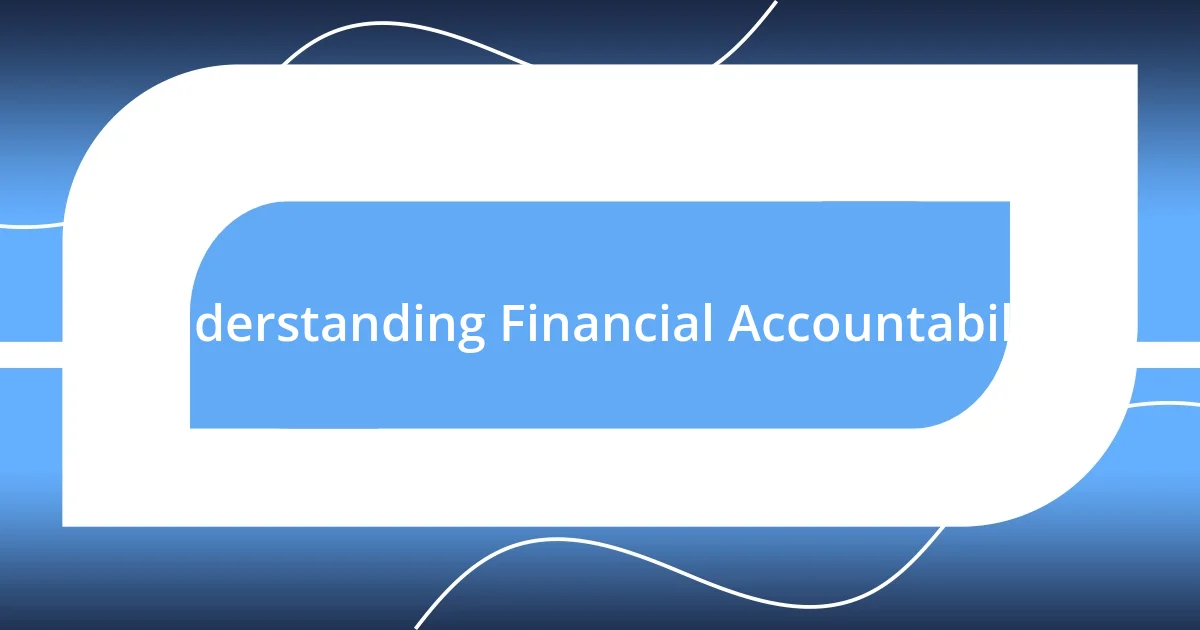
Understanding Financial Accountability
Financial accountability isn’t just about keeping track of numbers; it’s a mindset that transforms how we view money. I remember when I first started budgeting; I felt overwhelmed by the thought of tracking every expense, but soon realized it was empowering. It made me feel more in control and less anxious about unexpected costs. Have you ever felt the relief that comes from understanding where every dollar goes?
At its core, financial accountability means taking responsibility for our decisions and their outcomes. I’ve seen friends struggle because they ignored balancing their financial sheets, only to find themselves in debt. It’s a harsh wake-up call! Have you ever made a poor financial choice that left you questioning your judgment? I certainly have, and it served as a pivotal learning moment for me.
Building financial accountability requires regular reflection, not just on income and expenses but also on our values and goals. Each month, I sit down with my finances and review my priorities, which helps me align spending with what truly matters to me. It’s fascinating how much clarity this can bring. What if you could pinpoint the areas where you spend mindlessly? This kind of reflection opens the door to growth, creating a relationship with money that fosters peace of mind.
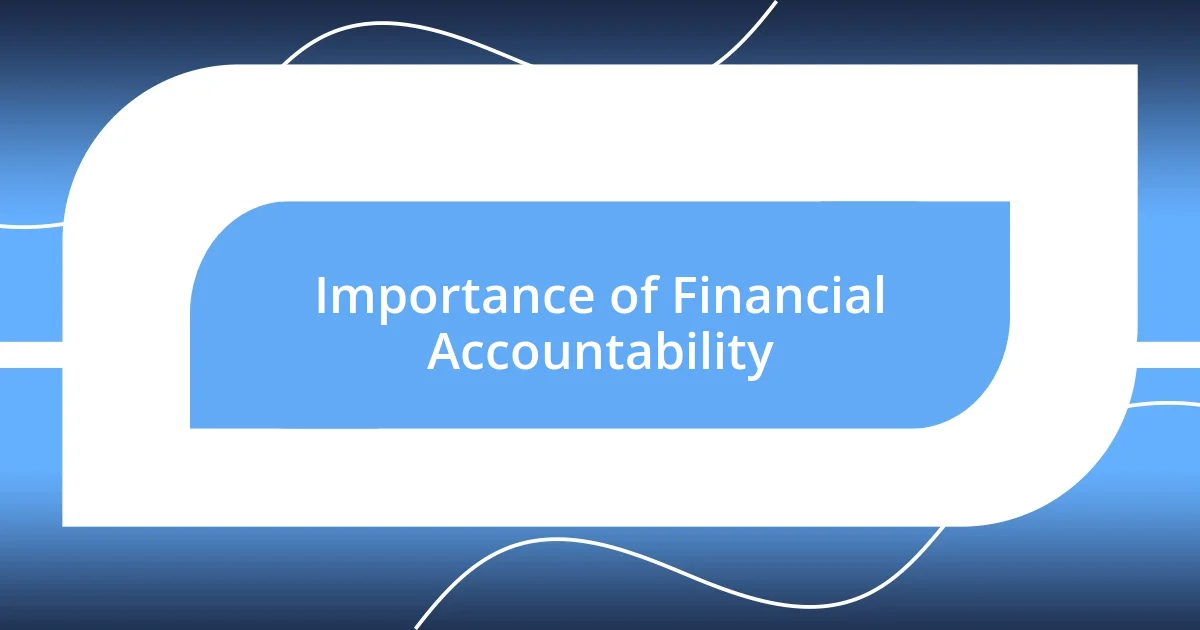
Importance of Financial Accountability
Financial accountability plays a crucial role in achieving financial stability. I recall a time when I didn’t track my spending closely. Those small purchases added up, and before I knew it, I was staring at a credit card bill that made my heart race. Have you ever faced a similar moment of realization? Being accountable not only makes you aware of where your money goes but also allows you to make informed decisions that align with your financial goals.
Moreover, it significantly enhances trust—both in yourself and in your relationships. When friends or family see you own your financial choices, it fosters an environment of support and transparency. I experienced this firsthand when I shared my budgeting journey with a close friend. It sparked questions and conversations that deepened our bond. Have you ever opened up about your financial journey? It can be liberating and even encourage others to take charge of their financial lives.
Lastly, embracing financial accountability encourages long-term planning. I’ve learned that by being diligent in tracking my finances, I can set aside funds for future dreams—like that vacation in the mountains I’ve always wanted. Have you considered what goals are truly important to you? Reflecting on your finances often reveals opportunities to save for what really matters.
| Benefits of Financial Accountability | Examples |
|---|---|
| Informed Decision-Making | Tracking expenses reveals spending patterns. |
| Enhanced Trust | Sharing financial goals builds stronger relationships. |
| Long-Term Planning | Allocating funds for future dreams. |
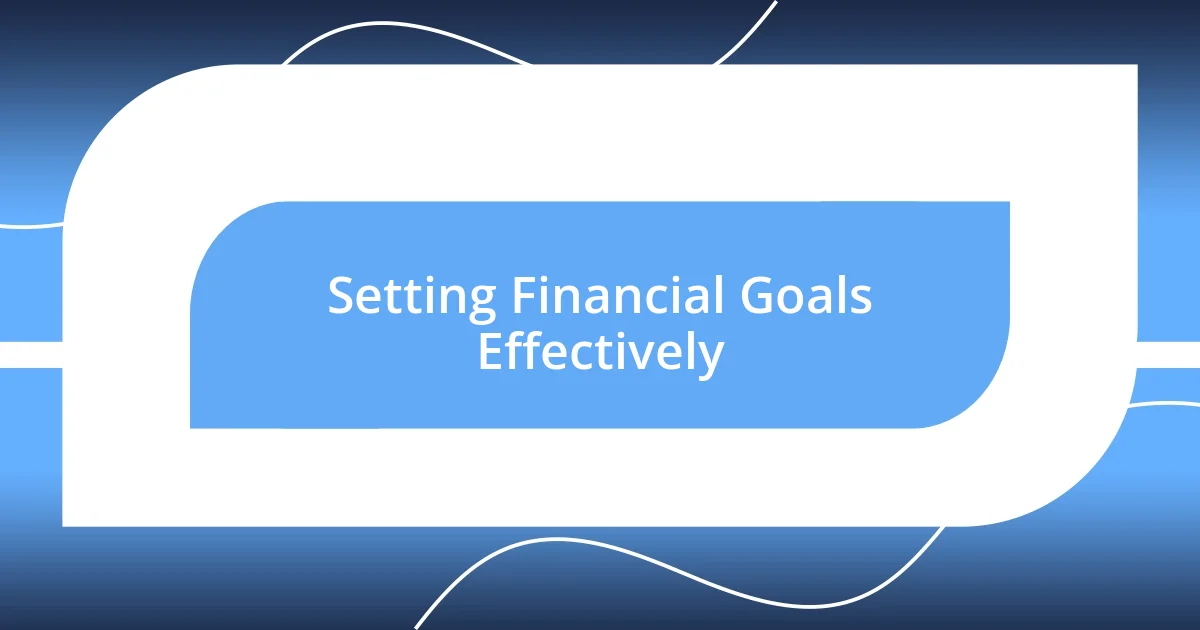
Setting Financial Goals Effectively
Setting financial goals effectively is a game-changer in our journey towards financial health. I remember my first attempt at goal-setting— I was so ambitious that I overwhelmed myself with lofty expectations. What I learned, though, is that clear and achievable financial goals are critical. They don’t just provide direction; they ignite motivation. When I broke my goals down into smaller milestones, I started to celebrate each small win. That felt incredible! Have you ever experienced that boost of confidence from ticking a box on your list?
To ensure your financial goals are effective, consider these key strategies:
– Be Specific: Define exactly what you want to achieve, such as saving $5,000 for a vacation.
– Set a Timeline: Choose a realistic timeframe that will help you stay focused, like saving that amount within 12 months.
– Create Actionable Steps: Break down each goal into smaller, tangible actions, like saving a certain amount monthly.
– Review Regularly: Regularly revisit your goals to track progress and adjust your plans as needed.
– Stay Flexible: Life happens; stay open to adjusting your goals in response to new circumstances.
I recall writing down a specific goal to pay off my credit card debt within six months. It felt daunting at first, but by tracking my spending and focusing on smaller, manageable payments, I achieved it. The sense of freedom I felt afterward was indescribable. Have you set a financial goal that seemed challenging at first? The journey you take can lead to significant personal growth and a more empowered relationship with your finances!
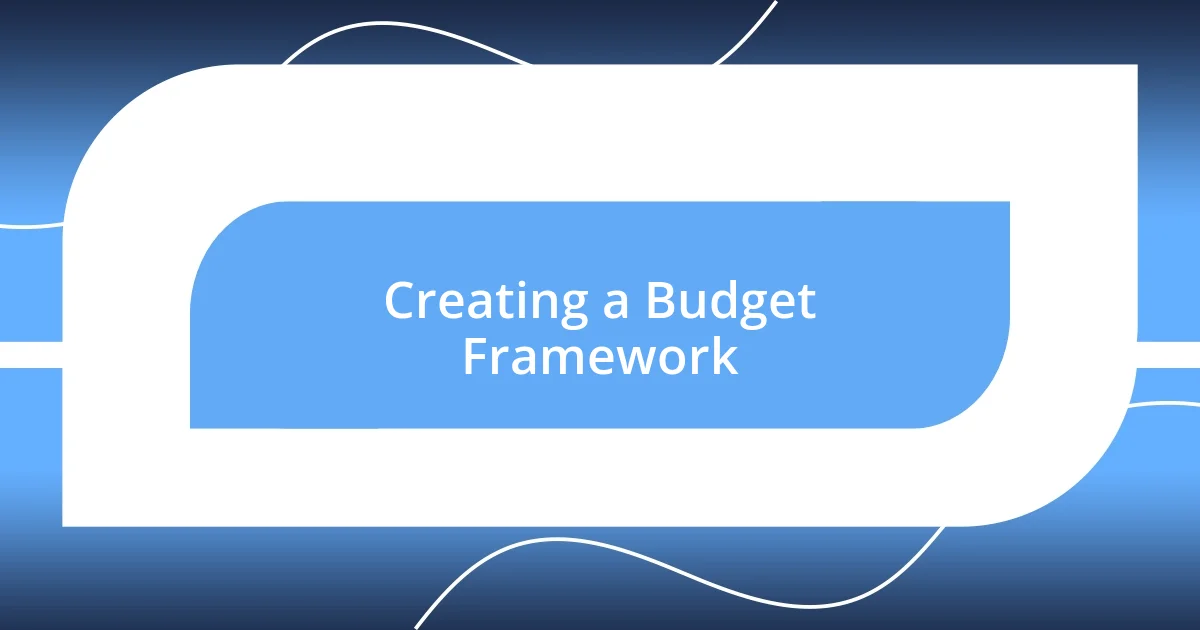
Creating a Budget Framework
Creating a budget framework is essential for maintaining financial discipline. I vividly recall my excitement when I sat down for the first time to build my budget. It felt like laying the foundation of a house. I began by listing my income sources and fixed expenses, which gave me a clear snapshot of my financial landscape. Have you ever felt that sense of control when you see everything laid out so simply?
Next, I categorized my expenses into discretionary and non-discretionary. The moment I distinguished between needs and wants was eye-opening. I remember looking at my coffee shop visits and realizing they added up to over $100 a month. I had to ask myself, “Is this really worth sacrificing my savings for a weekend getaway?” Recognizing where I could cut back enabled me to allocate funds more effectively, paving the way for better financial choices.
Finally, I made it a habit to review my budget monthly. I found it freeing to adjust and adapt my spending as life changed, and it helped me refine my framework. It’s like tuning a musical instrument; when everything is in harmony, I feel confident about my financial journey. Have you ever tried revisiting a budget? The adjustments not only keep you on track but also give insights into your evolving priorities. This process has transformed how I interact with my finances, making it a more rewarding and engaging experience.
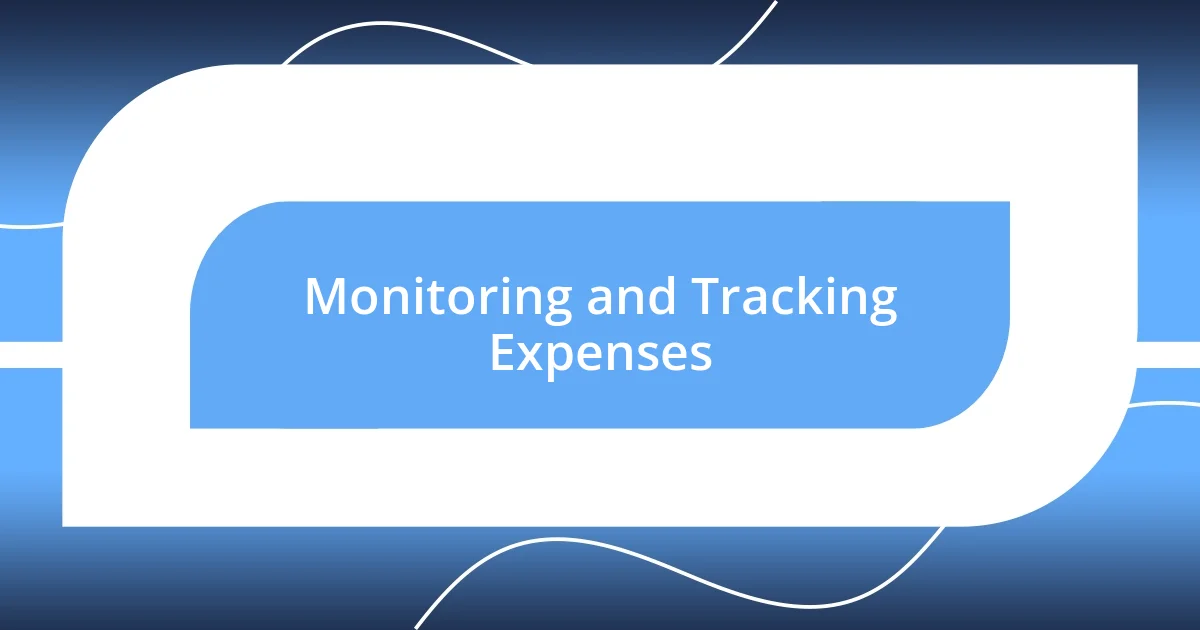
Monitoring and Tracking Expenses
Monitoring and tracking expenses is a pivotal step in taking control of your finances. I find that keeping a detailed record helps me see where my money is going—almost like having a personal financial detective on the case. Initially, I relied on spreadsheets and manual entries, but I eventually discovered budgeting apps that automated the process. I still remember the relief of having all my transactions categorized with just a few taps. Have you ever felt that weight lift off your shoulders when you finally gain clarity on your spending?
In my experience, the key is to track your expenses daily. I make it a routine to log my purchases right after I make them, which not only helps me remember but also keeps me accountable. One time, I reviewed my expenses after a busy week and was shocked to see how quickly those spontaneous online shopping sprees added up! It was an eye-opener that encouraged me to set a spending limit and stick to it. How often do we overlook those small purchases that derail our budgets?
Creating a visual overview of my spending habits has also been beneficial. I once experimented with a pie chart, breaking down categories like groceries, entertainment, and bills. The visualization revealed some surprises; for instance, I realized I was spending a significant portion of my income on dining out. I decided to challenge myself to cook at home more, which not only saved money but also transformed my relationship with food. Have you found that adjusting your habits can lead to unexpected benefits? Tracking expenses offers more than just numbers; it unveils patterns that can lead to mindful spending and informed decision-making.
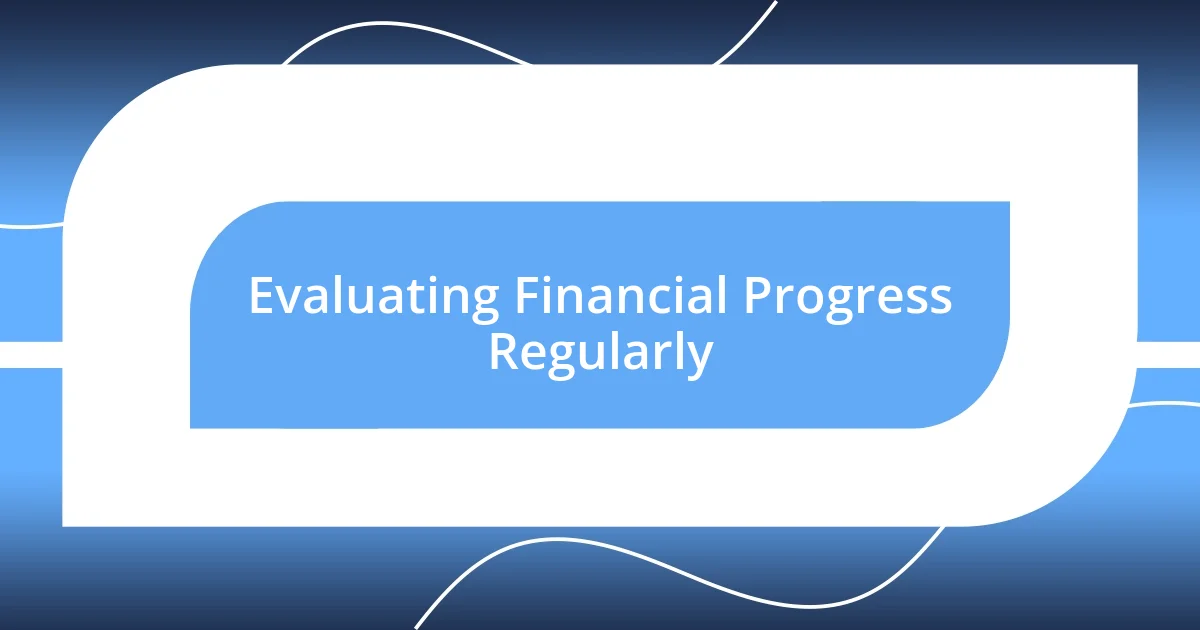
Evaluating Financial Progress Regularly
Evaluating financial progress regularly is like checking in with a close friend about their well-being. I remember the first time I did this; I allocated a specific day each month to sit down and reflect on my financial situation. It felt a bit daunting at first, much like stepping on a scale after a few indulgent weeks. But as I reviewed my goals versus my achievements, I started to see patterns in my spending and saving habits that I hadn’t noticed before. Have you ever felt the relief that comes with acknowledging where you truly stand financially?
To deepen my understanding, I created a financial journal where I recorded my monthly evaluations. This practice transformed my relationship with money; instead of feeling anxious about numbers, I started to celebrate small victories—like hitting my savings target for the month. One time, I discovered I had saved 20% more than planned, which reinvigorated my motivation to keep pushing forward. Tracking these milestones not only gave me a boost of confidence but prompted me to set bolder goals. How often do we underestimate the power of reflecting on our achievements?
I’ve also found that discussing my financial progress with a friend or mentor brings fresh perspectives. I vividly recall a conversation with a mentor who shared their own financial experiences and challenges. This exchange opened my eyes to new strategies I hadn’t considered and illuminated the importance of accountability in one’s financial journey. It made me realize how valuable it is to share our experiences with others. Have you ever had a discussion that shifted your outlook on your financial habits? Aligning with others can enhance your understanding and commitment, making the journey feel less isolating and more encouraging.
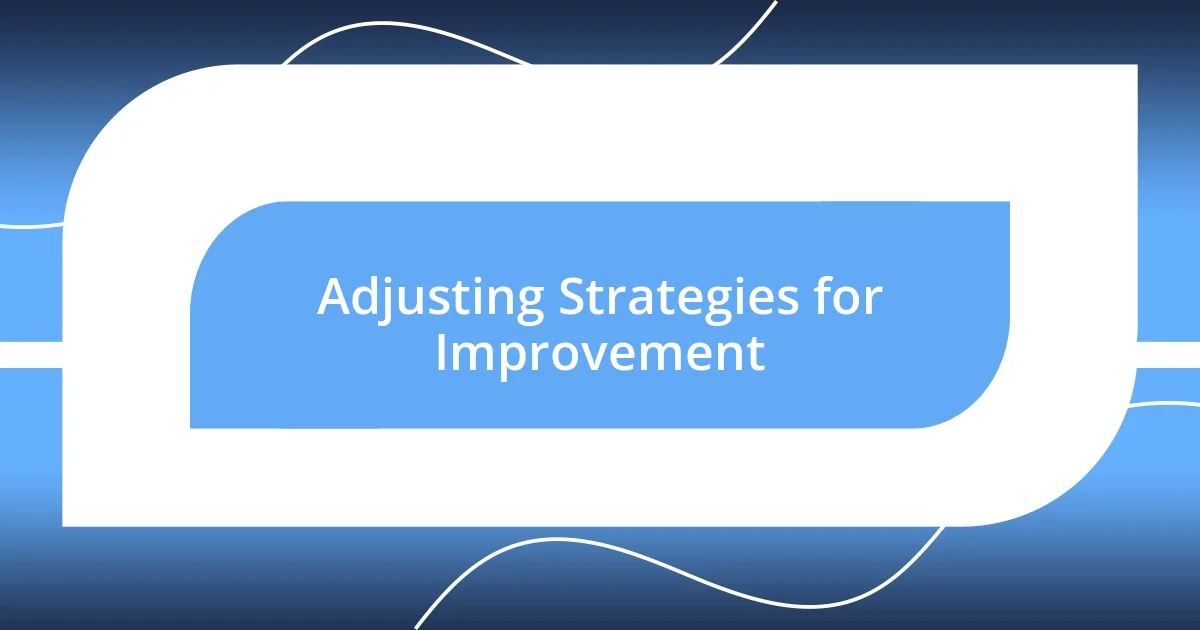
Adjusting Strategies for Improvement
Adjusting my strategies for improvement has become a continuous journey in my quest for better financial accountability. I remember a time when I felt overwhelmed by all the financial information out there. With so many tips and tricks, I struggled to know which strategies were right for me. That’s when I started small—selecting just one area to focus on each month, like saving or reducing expenses. Have you ever felt more at ease by simply narrowing your focus? This approach allowed me to gradually adapt and find what truly worked for my lifestyle.
Revisiting and refining my budgeting methods has been an eye-opener, too. I once followed a traditional 50/30/20 rule, but it didn’t align with my spending habits and goals. After a few months, I re-evaluated and tailored it to a 60/20/20 model that gave me more flexibility for spending while still prioritizing savings. The moment I shifted gears, everything felt more manageable. Have you ever had to rethink your strategy to find success? The beauty of adjusting your approach lies in creating a financial plan that genuinely reflects your needs.
Another significant change was integrating a reward system into my finances. On particularly tight months, I would treat myself to a small victory when I met my savings goals. I still chuckle when I think back to my first “reward”—it was a simple coffee shop treat I’d usually overlook. That small indulgence not only motivated me but also reinforced the importance of balancing discipline with enjoyment. Isn’t it invigorating to celebrate progress, no matter how minor it may seem? Adjusting my strategies became a blend of accountability and self-compassion, ultimately driving me toward a more fulfilling financial journey.












